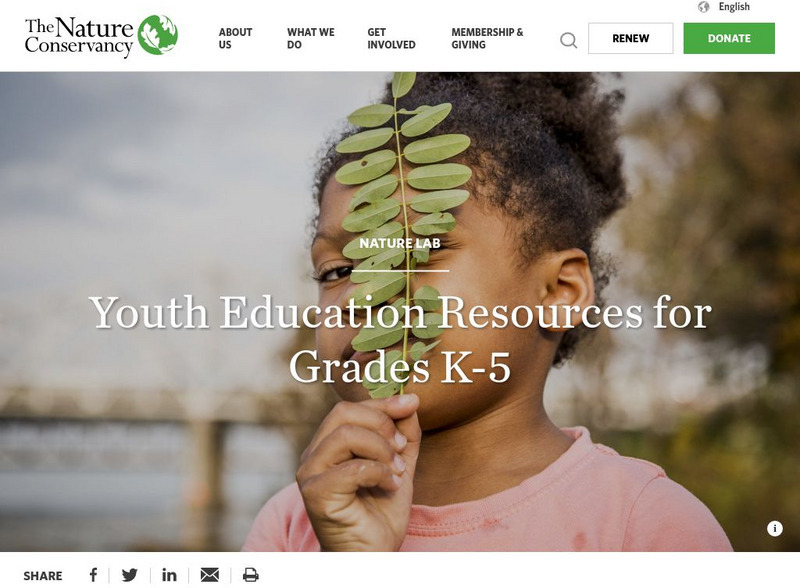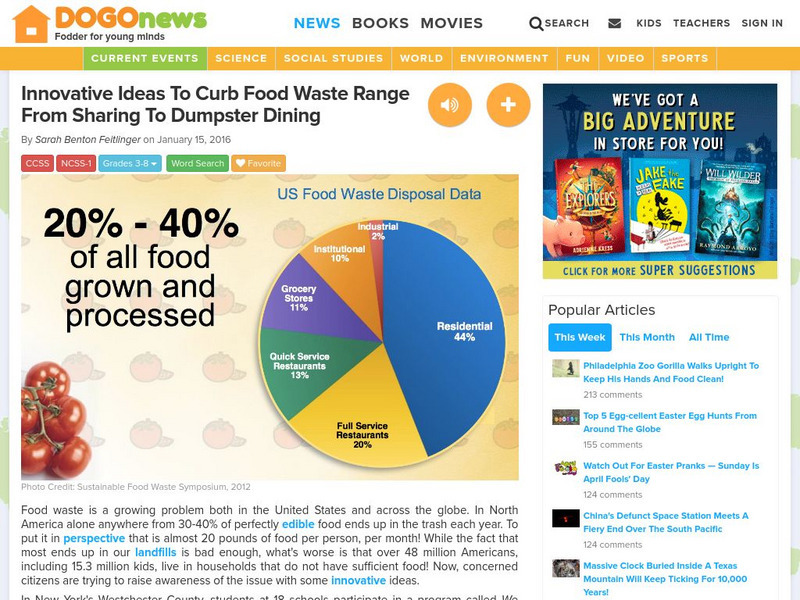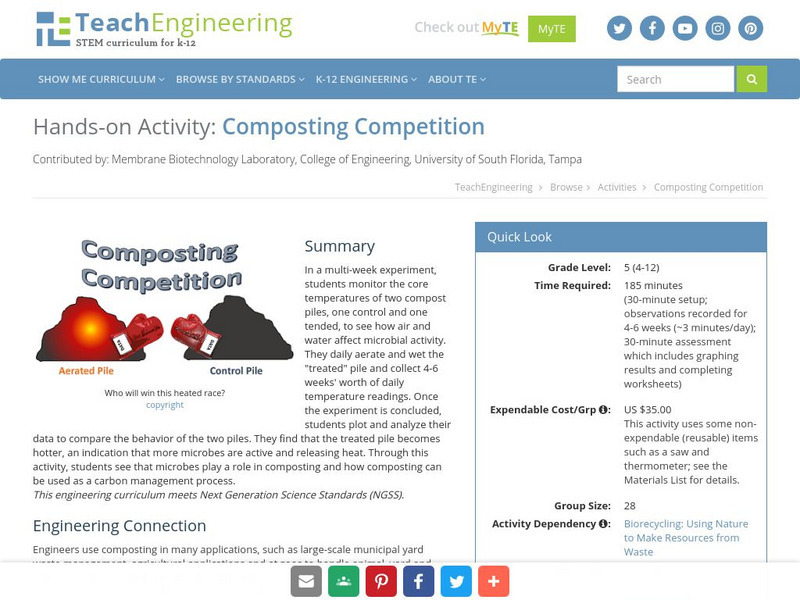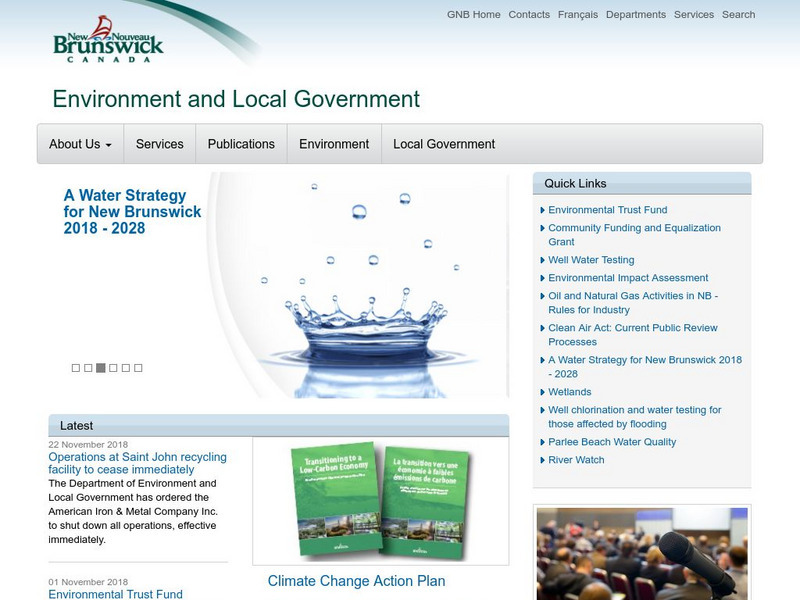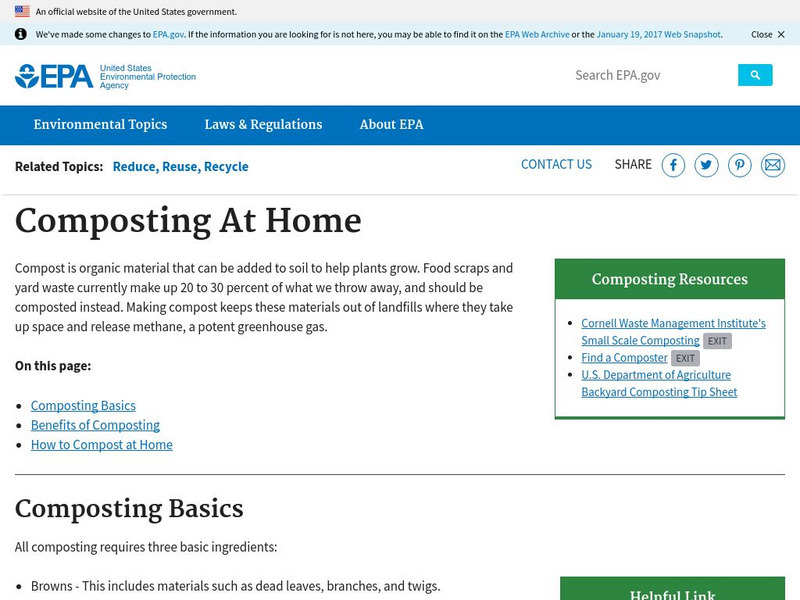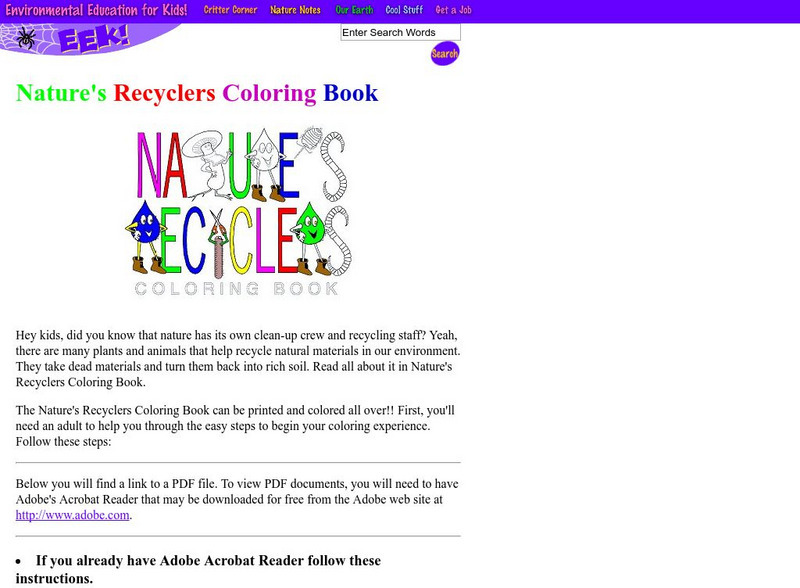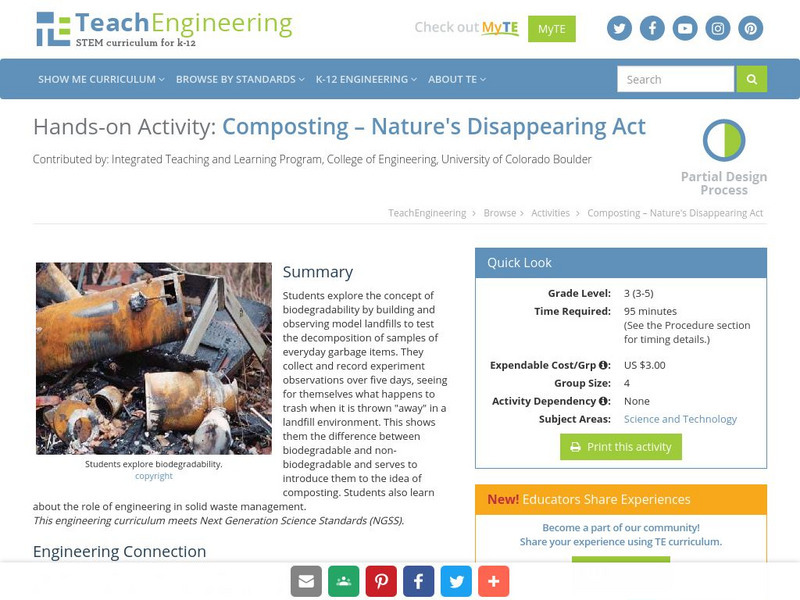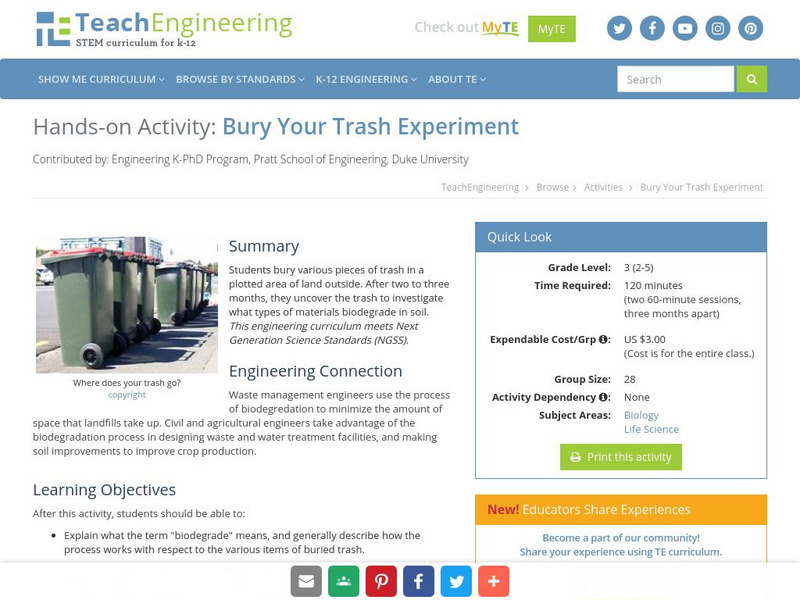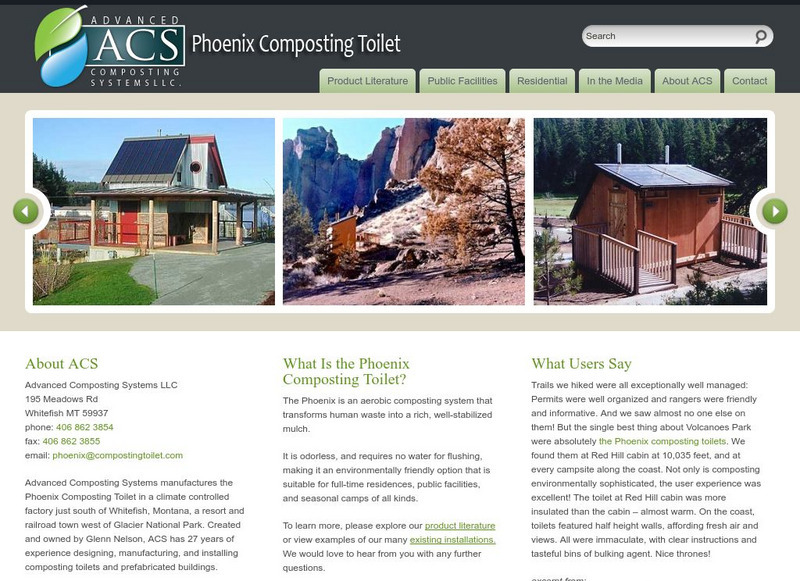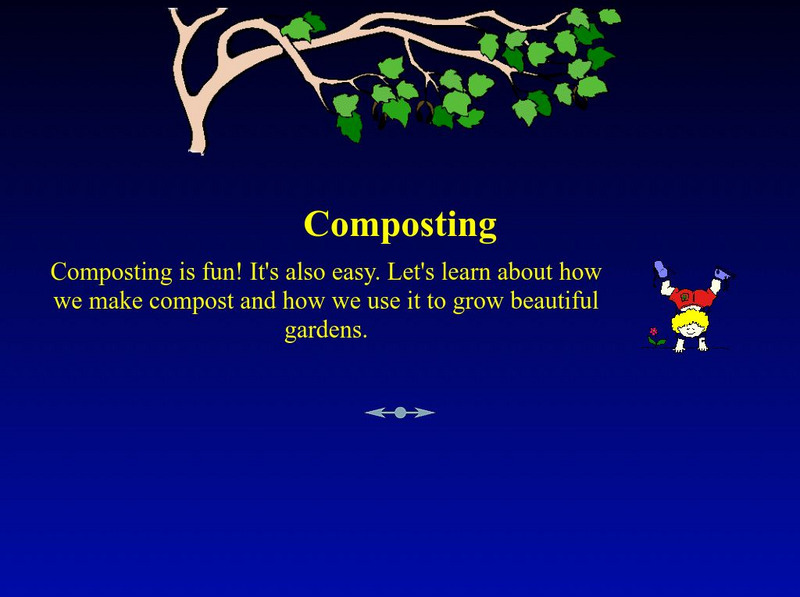Nature Conservancy
The Nature Conservancy: Gardens Activity Guide: Soil
In this lesson learners conduct a soil analysis to understand soil types and explore the relationship between the garden and healthy, fertile soil. Soil is a natural resource that is crucial to life on Earth and when managed properly, it...
DOGO Media
Dogo News: Innovative Ideas to Curb Food Waste
Article reports on some interesting strategies that schools and restaurants are using to help raise awareness and combat food waste. Includes video.
TeachEngineering
Teach Engineering: Design a Net Zero Energy Classroom
Students create a concept design of their very own net-zero energy classroom by pasting renewable energy and energy-efficiency items into and around a pretend classroom on a sheet of paper. They learn how these items (such as solar...
TeachEngineering
Teach Engineering: Composting Competition
In a multi-week experiment, students monitor the core temperatures of two compost piles, one control and one tended, to see how air and water affect microbial activity.
TeachEngineering
Teach Engineering: What Will Biodegrade?
Students investigate what types of materials biodegrade in the soil, and learn what happens to their trash after they throw it away. The concepts of landfills and compost piles will be explained, and the students will have an opportunity...
Other
Nrdc: Composting Is Way Easier Than You Think
The NRDC breaks down how to easily achieve at-home composting. Find out what can and cannot be composted.
Other
New Brunswick Waste Management /"Backyard Magic"
Comprehensive description of the environmental benefits of composting solid waste. Complete directions for composting, detailed description of composting chemistry, suggestions for applications of humus, question and answer page,...
TeachEngineering
Teach Engineering: Biorecycling: Using Nature to Make Resources From Waste
By studying key processes in the carbon cycle, such as photosynthesis, composting, and anaerobic digestion, students learn how nature and engineers biorecycle carbon.
US Environmental Protection Agency
Epa: Composting at Home
Investigate the benefits of composting and discover ways to do it easily at home.
TED Talks
Ted: Ted Ed: Vermicomposting: How Worms Can Reduce Our Waste
Nearly one third of our food ends up in the trash can. Matthew Ross details the steps we can all take to vermicompost at home, and why it makes good business sense to do so. [4:29]
Environmental Education for Kids
Eek!: Nature's Recyclers Coloring Book
Did you know that nature has its own clean-up crew and recycling staff? Yeah, there aremany plants and animals that help recycle natural materials in our environment. They take deadmaterials and turn them back into rich soil. Use this...
University of Missouri
Microbes in Action: Classroom Activities: Composting by Microbes
A science experiment to observe how materials decompose over time, By recording the smell, appearance, and movement of materials over three weeks, students will be able to make conclusions about their decompositions. Students will also...
Other
City of Phoenix: Recyclesaurus Activity Book [Pdf]
This activity book teaches about reducing, reusing, and recycling materials. Students can decode words, color, do a word scramble, and learn how to compost. Written in both English and Spanish.
Other
Composting Practices (Pdf) [Pdf]
This publication explains the agricultural and environmental benefits of composting household waste. It explains the difference between hot and cool composting systems. It also documents research indicating turfgrass benefits from humus...
Other
Composting: Getting Down to Paydirt [Pdf]
Learn how composting works, how to build a composter, and a recipe for creating your own compost to fertilize your garden and crops.
Texas A&M University
Aggie Horticulture Network: Composting for Kids
Use this resource to learn about how we make compost and how we use it to grow gardens.
National Geographic Kids
National Geographic Kids: Recycle Roundup Action Game
Sort as much trash as possible in two minutes. Guide the character around the park to pick up items, such as a apple cores, water bottles, and boxes, and take them to the correct bins. There are bins for recyclable, non-recyclable, and...
TeachEngineering
Teach Engineering: Composting Nature's Disappearing Act
In this activity, students explore the idea of biodegradability by building and observing a model landfill. This serves as an introduction to the idea of composting. Students learn about the role of engineering in solid waste management.
TeachEngineering
Teach Engineering: Bury Your Trash!
This activity will allow students to bury various pieces of trash in a plotted area of land outside. After approximately two to three months, the trash will be uncovered to allow the students to investigate what types of materials...
TeachEngineering
Teach Engineering: 3 Rc (Reduce, Reuse, Recycle and Compost)
In this lesson plan, students expand their understanding of solid waste management to include the idea of 3RC (reduce, reuse, recycle and compost). They will look at the effects of packaging decisions (reducing) and learn about...
Read Works
Read Works: Get in the Loop!
[Free Registration/Login Required] An informational text about the steps of recycling and tips for reusing and recycling. A question sheet is available to help students build skills in reading comprehension.
Other
Advanced Composting Systems: Phoenix Composting Toilet
Explains how composting toilets work, their benefits to the environment, useful applications, and information on how to choose a system.
Texas A&M University
Texas A&m University: Composting
This resource from the Texas A&M University is easy to understand and contains everything you need to know about composting. The basic lessons are supplemented with pictures of students involved in setting up compost bins and trenches.
Other
Junior Master Gardener: Compost Critters
Try to guess the name of each insect, worm, or other small creature that lives in a compost bin. Clicking on each image leads to a page of detailed information about that species.


